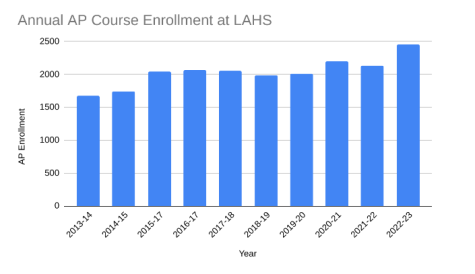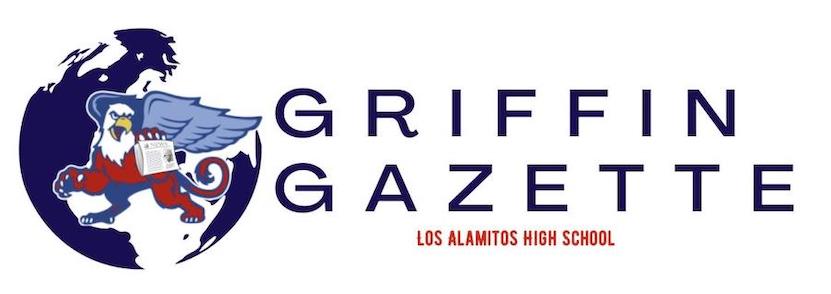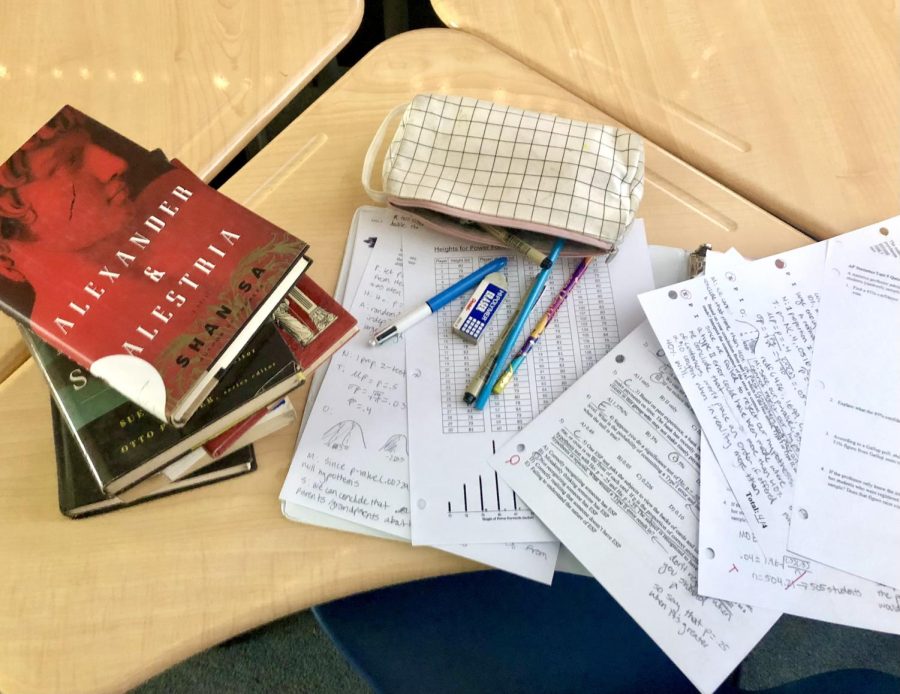Understanding academic rigor
An increase in high level course enrollment nationwide brings academic rigor into the spotlight.
An array of books, homework, and school supplies scattered on a desk.
February 13, 2023
LOS ALAMITOS, CA – Although traditionally used to describe something exhaustive or demanding, the definition of the word “rigor” has recently taken a positive connotation in the academic world. Students hear from parents, teachers, and counselors that they should strive to take “rigorous” classes, especially if they plan to attend university. Rigorous classes include honors, AP, and college prep courses.
Over the past decade, the number of students enrolled in rigorous courses has seen large growth. A 2021 College Board report showed that there has been a 28.6% increase in students who took at least one AP exam over the past decade. This statistic holds true for Los Alamitos High School, too. Over a ten year period, AP class enrollment at Los Al increased from 1675 students in the 2013 to 2014 school year to 2449 students in the 2022 to 2023 school year.

As shown in the graph, AP class enrollment at Los Al has seen a gradual increase over the past decade. This year marks an all time high for Los Al.
The increase in AP enrollment is staggering, but the question at hand remains: Are rigorous courses really worth it?
While it is undoubtedly beneficial for students to strive to take high-achieving courses for their specific interests, many students go beyond that and take AP classes in every subject.
Rose Kong, a Los Al senior currently enrolled in several AP classes, shared that although some of the classes she is taking don’t pertain to her major, she hopes that they will help her get into a good university and provide her with college credits. However, in reference to her future career, she understands that not all of the knowledge she is currently learning in her classes will be applicable to her.
“Only the [classes] related to my majors will be useful to my future, [careerwise]. The other classes work for Jeopardy,” Kong said.
Kong is assuredly correct on the front that enrolling in rigorous courses will help her get into a prestigious university. Colleges are interested in students who are willing to push themselves. An individual’s success in rigorous courses in high school is one of the key indicators of how successful they will be in college.
However, a recent trend of student burnout has become prevalent in today’s youth. Student burnout is a specific type of burnout that happens to students who are exposed to a large amount of academic pressure and stress. Burned out students often have trouble focusing and lack motivation in areas where they were previously excelling. Student burnout can also manifest through physical health issues such as exhaustion, headaches, and muscle aches.
Additionally, a study from Northern Illinois University found that some of the biggest reasons for academic dishonesty are performance anxiety and an inability to manage the demands of student life. Although many different types of students experience academic burnout, oftentimes students who take several rigorous courses experience this condition more frequently than those who do not.
Although rigorous courses can be stressful, some students genuinely enjoy the challenge. Sarah Saadeh, a Los Al senior enrolled in a multitude of AP classes, shared that taking more rigorous courses has pushed her to become a better student.
“I learned new study habits and was able to apply concepts that I learned in previous classes,” Saadeh said. “I [also] became better at managing my time and learned how to remain focused and self-disciplined.”
Saadeh’s views are some of the many pros of rigorous courses. Besides looking good on college applications, taking rigorous classes helps students develop complex thinking skills both inside and outside of school.
Although she is a prospective engineering major, Saadeh also finds meaning in her classes that don’t pertain to her major.
“Courses such as AP English Language and Literature and AP US History allowed me to develop analysis skills and improved my writing and communication abilities,” Saadeh said. “The convergence between… different types of classes helps better prepare me for higher level education in college.”
With an increased push for academic rigor, students across the nation have enrolled in more and more AP and college prep classes. Rigorous coursework is tough, but depending on the person, it can be extremely beneficial. That being said, it is still important to understand the negative effects that a heavy workload can have on an individual’s mental and physical health.







Katie A. • Feb 14, 2023 at 12:31 pm
Amazing article, Alicia! I like how you introduce multiple perspectives on this topic! Rigorous classes can be worth it in some ways, but it is ultimately up to the student to decide.